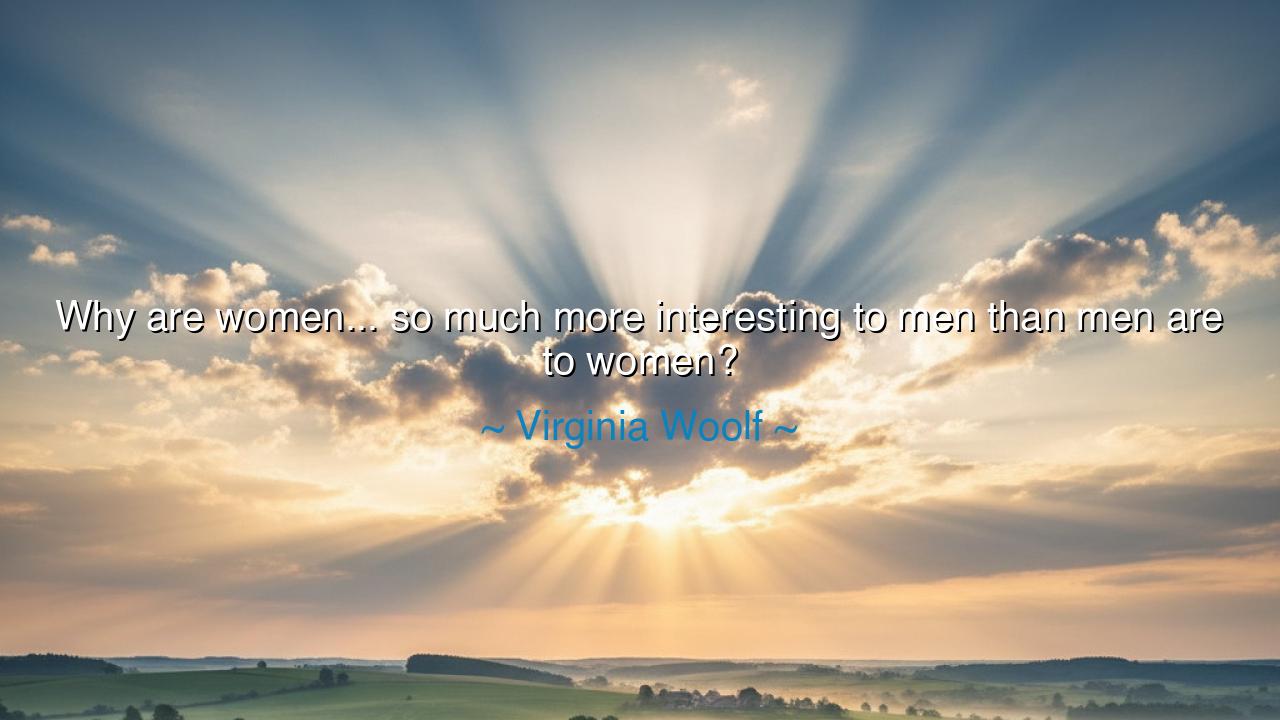
Why are women... so much more interesting to men than men are to






Listen, O children of wisdom, to the words of Virginia Woolf, a woman whose reflections on gender, identity, and human relationships resonate deeply through the ages. She spoke thus: "Why are women... so much more interesting to men than men are to women?" These words, though simple, reveal a deep truth about human nature, the complexity of attraction, and the unequal dynamics that have shaped relationships for centuries. Woolf’s question challenges the very fabric of gender relations, shedding light on the mystery of why men often find women so fascinating, while the reverse does not always hold true.
At the heart of Woolf’s statement is the recognition that attraction is often rooted not just in physical appearance or biological drives, but in psychological and cultural forces. Men, in their pursuit of understanding and connection, may find women to be a mystery, a challenge that captivates their attention. Women, on the other hand, have often been placed in the role of the observer, conditioned by centuries of societal expectations to prioritize self-restraint over self-expression. This imbalance has created an asymmetry in the dynamics of attraction, where men may view women as objects of wonder, while women, with their own complex inner worlds, may not always reciprocate the same intensity of interest.
Consider, O children, the ancient Greek society, where women were largely excluded from the public sphere and men were free to indulge their curiosity and desires. The Greek philosophers, such as Socrates and Aristotle, often debated the nature of women, seeing them through the lens of their own male experience. In this male-dominated society, women were seen as objects to be understood, desired, or even used, but rarely as equals with their own complexities. Men’s fascination with women stemmed from the very fact that women were often inaccessible, held behind the veil of mystery. The more they were hidden, the more their mystique grew, making them seem all the more fascinating.
This dynamic of fascination continues in many ways even to this day. Throughout history, women have been portrayed in literature, art, and mythology as the object of male desire. The archetype of the distant woman, the one who is unattainable or mysterious, has always sparked the imagination of men. Romeo and Juliet, Dante and Beatrice, and countless other examples reflect the mystical allure that men often find in the women they cannot easily possess. In contrast, women’s interest in men has often been shaped by different cultural norms—emphasizing security, companionship, and emotional resonance—which might not have the same mystifying quality.
Woolf’s words also point to the socio-cultural conditioning that governs human relationships. Women, for much of history, have been reduced to roles that limit their self-expression. They have been told to be humble, quiet, and supportive, often discouraged from displaying their full personalities. This repression can cause women’s own interests in men to be less about mystery and more about practical connection. Men, in turn, may see this as less fascinating because they do not encounter the same enigmatic complexity that has traditionally surrounded women. Woolf’s insight reveals the interplay of power, expectation, and gender roles in shaping attraction.
The lesson Woolf offers is not one of despair, but of reflection and understanding. True attraction—whether it be between men and women, or between any two individuals—arises from mutual curiosity, respect, and understanding. We must acknowledge the power dynamics that have shaped how we perceive each other, and how those perceptions may cloud the genuine connections we could make. To truly know one another, we must break free from these long-standing societal frameworks that dictate how we relate to each other. Men and women alike must strive to see the other as a full and complete individual, not as an object to be possessed or understood in a moment, but as a companion on the shared journey of life.
And so, O children, let us take Woolf's words to heart. Strive not to see the world through the lens of gendered roles and expectations, but rather, let us seek to understand each other in our full humanity. Let us embrace the mystery of one another, not with the aim to conquer or possess, but to explore with curiosity, empathy, and respect. When we lift the veil of societal constraints, we will find that we are not so different, but that our true connection lies in the shared experience of being human. Let us, then, embrace each other’s complexity, and in that union, may we find the depth and richness of true understanding.






AAdministratorAdministrator
Welcome, honored guests. Please leave a comment, we will respond soon